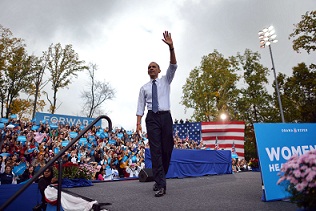CAIRO: A leading independent Egyptian newspaper said Tuesday its mogul publisher has fired the daily’s chief editor, an outspoken government critic — the latest development in what watchdogs say is a campaign of restricting media freedoms in the country.
Ibrahim Eissa’s dismissal comes amid growing uncertainty over Egypt’s political future, with parliamentary elections less than two months away and constant speculation about 82-year-old President Hosni Mubarak’s health.
Al-Dostor reported on its website early Tuesday that its publisher Al-Sayed Al-Badawy fired Eissa effective as of Monday. Eissa, however, claimed he is still in charge of the daily’ online edition. Neither of the two could immediately be reached for comment.
At the paper’s Cairo office, reporters reached by phone said they were the only ones who showed up for work Tuesday while editors and management staff were absent.
In 2008, Eissa was sentenced to two months in prison on charges of insulting Mubarak after he reported about the president’s health. Mubarak later pardoned him.
His sacking followed Monday’s statement by Egypt’s Journalists’ Union, which said Eissa was pulled off his popular TV talk show without explanation. The union accused the government of cracking down on media critical of the authorities, saying there was "an organized attack on media freedoms … especially in light of the approaching parliamentary elections."
Egypt’s media, and TVs in particular, were tightly controlled in the past, restricted to positive coverage of government activities. But an explosion of privately owned satellite stations over the past five years has brought programming that has pushed government boundaries when discussing politics.
Business tycoon Al-Badawy, who heads the opposition Al-Wafd Party and the party newspaper’s board, bought Al-Dostor in August shortly after he was elected to the party post. At the time, there was speculation he would fire Eissa in a move that would bring him and Al-Wafd closer to the government.
Al-Wafd is expected to field a large number of candidates in November election.
Al-Dostor has been sharply critical of the government and often breaks political, social and religious taboos in commentaries on Egyptian society. Its sharp language earned the ire of censors and its copies were confiscated several times in the 1990s.
The government closed the paper in 1998 for seven years after it published a statement by an Islamist group that threatened Coptic Christian businessmen in Egypt.
The first sign of the latest media crackdown came in early September, when private and opposition newspapers were ordered to pull reports of a street poster campaign supporting the powerful intelligence chief Omar Suleiman for president. Journalists and editors were barred from writing about the story in subsequent issues and the posters were removed.
The question of who will succeed Egypt’s ruler of almost 30 years has gained added urgency since Mubarak traveled to Germany earlier this year for surgery to remove his gallbladder and a benign growth in the small intestine.
Mubarak has not yet announced whether he will run for a sixth term in 2011 presidential elections. His 46-year-old son Gamal has been a rising force in Egyptian
Another program, the 12-year-old “Al-Qahira Al-Youm” (Cairo Today) was also shut down. Like Eissa’s talk show, it was broadcast on private television networks. But Information Minister Anas El-Fiqqi told The Associated Press the closure of Orbit TV’s "Cairo Today" had no political dimension and was only because the network had not paid its bills.
